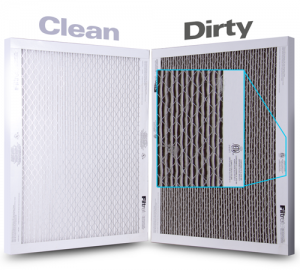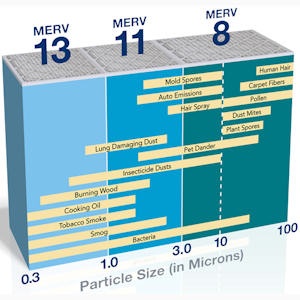 Never skimp on changing your HVAC filter. It’s the most important self-maintenance you can do for one of the biggest expenses in your home. But people don’t realize the consequences of shirking off this crucial yet simple and inexpensive effort. In fact, dirty filters are the most common reason HVAC systems shut down, which means you’ll be paying for a service call when that happens. And think of this: the worst-case scenario… you have to replace your entire HVAC system. How does your wallet feel about that?
Never skimp on changing your HVAC filter. It’s the most important self-maintenance you can do for one of the biggest expenses in your home. But people don’t realize the consequences of shirking off this crucial yet simple and inexpensive effort. In fact, dirty filters are the most common reason HVAC systems shut down, which means you’ll be paying for a service call when that happens. And think of this: the worst-case scenario… you have to replace your entire HVAC system. How does your wallet feel about that?
Checking and changing your filters regularly will keep your system running smoothly, extend the lifespan of your AC, save on your power bill and keep your home air quality healthy. Now that’s a lot of great benefits for one easy task!
Check your filter monthly and change it when it’s dirty…. at least every 90 days.
We agree with the U.S. Department of Energy’s recommendation. Check your filter at least every month and change it within 90 days. If you have pets or smokers in your home, you should check it twice a month.
How do you know if the filter needs to be changed? In most cases, it will be obvious. But if you’re unsure, run your finger across the filter. If it picks up dirt and leaves a line across the filter, time to change.
Choose the filter that’s best for your system and your lifestyle.
Ironically, the most efficient filters, which are the most expensive, are not necessarily what’s best for you. Conversely, the cheapest, which are the least efficient filters, are probably not your best bet either. So how do you decide?
 Your best resource is your HVAC service company. Of course, size is an obvious factor, that you can determine yourself just by taking measurements of the filter frame. But when it comes to efficiency, our recommendations are based on the MERV (Minimum Efficiency Reporting Values) system created by the American Society of Heating, Refrigeration & Air-Conditioning Engineers. The ratings range from 1 (least efficient) to 20 (most efficient).
Your best resource is your HVAC service company. Of course, size is an obvious factor, that you can determine yourself just by taking measurements of the filter frame. But when it comes to efficiency, our recommendations are based on the MERV (Minimum Efficiency Reporting Values) system created by the American Society of Heating, Refrigeration & Air-Conditioning Engineers. The ratings range from 1 (least efficient) to 20 (most efficient).
The least efficient filters allow the most airflow but allow in more dirt, dust and other unhealthy particles. The most efficient ones do the best job of blocking out the particles but allow the least amount of airflow, which can be taxing on your system. That’s why your best bet is probably somewhere in the middle – an 8 for older models or an 11 for newer models. So who uses the lowest efficient or most efficient? People who don’t want to spend a little more (and honestly, it’s just a minimal amount) to achieve optimum results can go with the lowest. Clinical settings, such as hospitals, typically have units that require the higher ratings for obvious reasons.
Some systems do require a built-in filter. These are high maintenance and not very efficient. If you have this kind of system, talk to us about your options.
Be prepared.
First, make sure you know where your filters go. Typically, one goes right next to your air handler inside your home. You may also have air return grilles in the in ceiling or wall. When you replace your filter in a return grille, plan to also clean the grille.
Keep filters in stock and easily accessible. The easier you make it on yourself, the more inclined you will be to make filter replacement a part of your regular routine.
Ask TRAVERSAIR!
We are here for you to walk your through filter replacement and answer any questions you have about filters or anything else regarding your HVAC. Educating customers is a core value of our company. That’s why we say, “Service that’s telling, not selling.”



